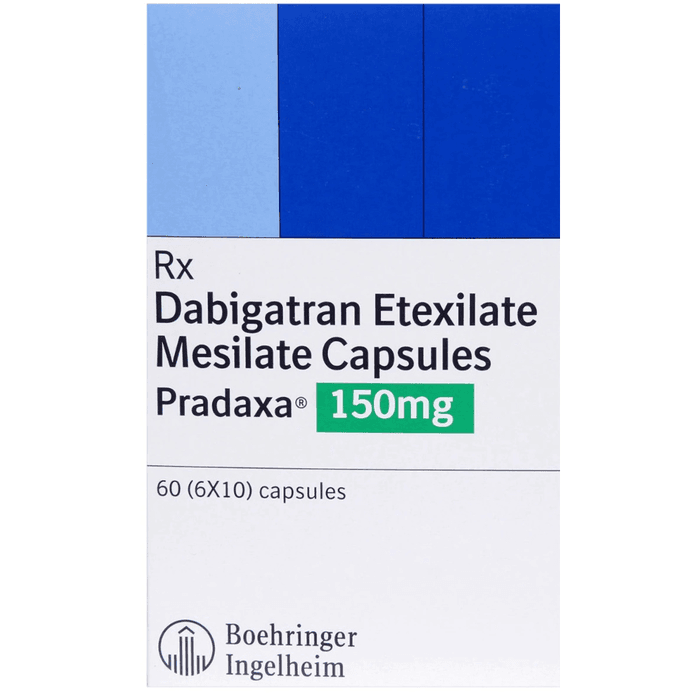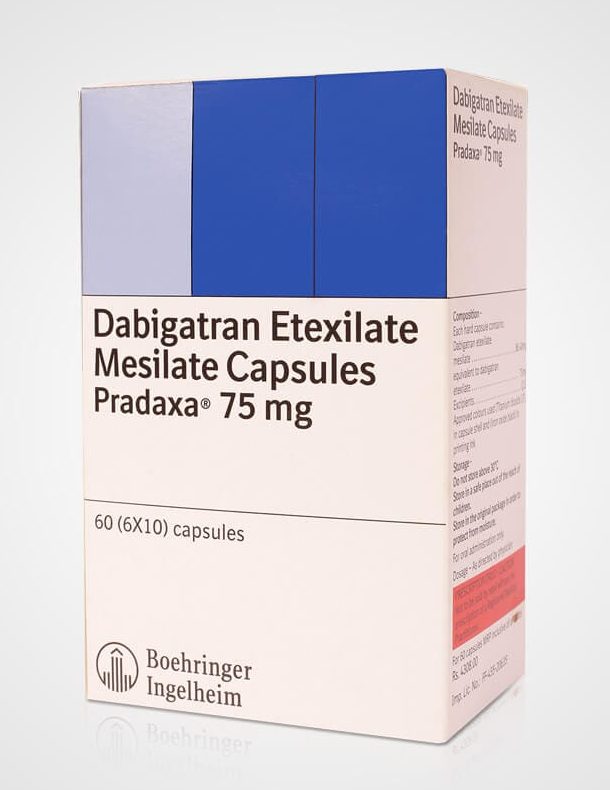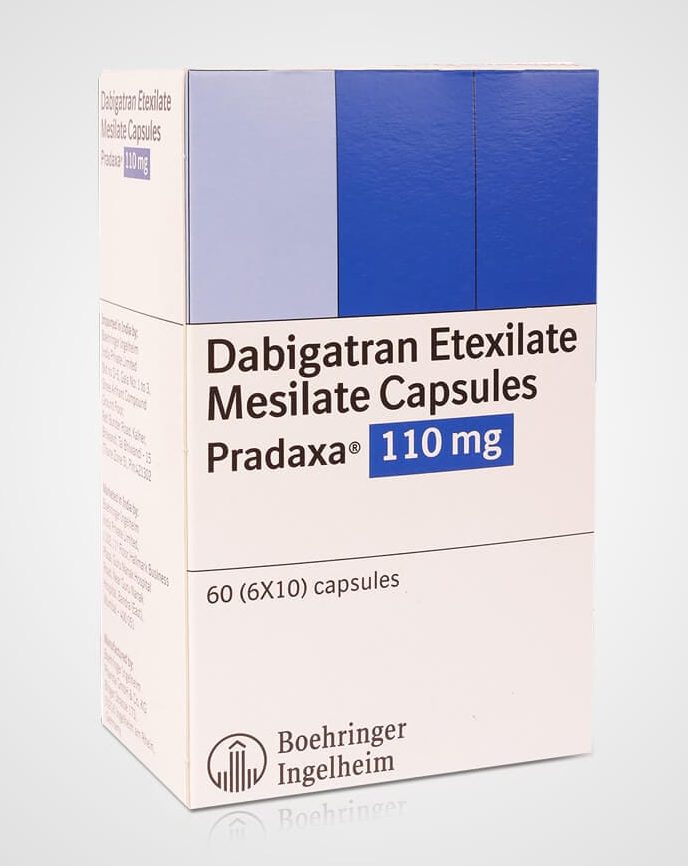Please note: a valid prescription is required for all prescription medication.
Pradaxa product overview: uses, dosing, and safety
Start 2026 with savings: Use code SAVE10 for 10% OFF all RX meds. Jan–1 Mar. Ozempic from Canada and Mounjaro Vial not included. Offer valid until March 1st. Coupon code cannot be combined with other offers. For products with “Bulk Savings”, the discount will be applied to the regular price for 1 unit. Maximum allowable quantity equal to a 90 day supply per single order.
Price range: $91.99 through $162.99
You save


Pradaxa is a prescription anticoagulant (blood thinner) that helps reduce the risk of harmful clots in certain conditions. People comparing options sometimes start with Pradaxa price, but safe use depends on the indication, kidney function, and other medicines. Some patients explore Ships from Canada to US as part of cross-border fulfilment options, depending on eligibility and jurisdiction.
What Pradaxa Is and How It Works
Pradaxa contains dabigatran etexilate, a prodrug that becomes dabigatran in the body. Dabigatran is a direct thrombin inhibitor (it blocks thrombin, also called factor IIa). Thrombin is an enzyme that helps form fibrin, the “mesh” that stabilizes blood clots. By reducing thrombin activity, this medicine lowers clot formation risk, which can help prevent complications such as stroke in certain patients.
It is important to use anticoagulants exactly as prescribed and to keep a current medication list. CanadianInsulin operates as a prescription referral service and may confirm prescription details with the prescriber. This helps ensure the product, dose, and directions match what the clinician intended.
Pradaxa does not “dissolve” an existing clot on its own; it reduces the body’s ability to form and extend clots while natural processes work. Because anticoagulation affects bleeding control throughout the body, treatment choice is individualized, especially when there is reduced kidney function, a history of gastrointestinal bleeding, or upcoming procedures. In jurisdictions where permitted, dispensing is handled by licensed third-party pharmacies rather than by the referral platform.
Who It’s For
Pradaxa is used in selected patients who need anticoagulation. Common uses include reducing the risk of stroke and systemic embolism in non-valvular atrial fibrillation and treating or preventing recurrence of venous thromboembolism (such as deep vein thrombosis and pulmonary embolism) under clinician direction. Condition context can be reviewed in the Atrial Fibrillation and Blood Clot Dvt Pe hubs, which provide browsable lists of related therapies.
Not everyone is a candidate for dabigatran. It is generally avoided in people with active pathological bleeding, a history of serious hypersensitivity to dabigatran, or certain high-risk heart valve situations (for example, mechanical prosthetic heart valves). Clinicians also consider kidney function, age, body size, prior bleeding events, and whether a patient is likely to miss doses, since missed doses can reduce anticoagulation coverage.
Dosage and Usage
Pradaxa is taken by mouth as a capsule. Dosing schedules depend on the indication, kidney function, and sometimes prior anticoagulant use. For some indications it is taken twice daily, but the exact regimen and duration should follow the prescriber’s instructions and the product labeling used in your jurisdiction. Do not change the dose, stop therapy, or “catch up” after missed doses without clinician guidance.
Capsules should be swallowed whole with water. They should not be opened, crushed, or chewed, because altering the capsule can change absorption and increase exposure. If a dose is missed, the next steps depend on timing and the prescribed schedule; a pharmacist or prescriber can provide label-based instructions for your specific directions. Quick tip: Keep an updated list of prescription and nonprescription products to share at visits.
Strengths and Forms
Pradaxa is commonly supplied as oral capsules in more than one strength. Many patients will see Pradaxa 75 mg capsules or Pradaxa 150 mg capsules depending on the indication and kidney function considerations. In generic form, you may also see wording such as dabigatran etexilate mesylate on the carton or pharmacy label. Availability of strengths and package types can vary by country, pharmacy, and regulatory approvals.
| Form | Common strengths | Notes |
|---|---|---|
| Capsule | 75 mg | Strength selection is clinician-directed. |
| Capsule | 150 mg | Often used when appropriate for indication and renal status. |
When comparing options, Pradaxa price may differ by strength, days’ supply, and whether a brand or generic dabigatran product is used. Packaging can be bottles or blister cards; the container type matters because dabigatran is sensitive to moisture and should be kept in original packaging unless labeling permits otherwise.
Storage and Travel Basics
Store Pradaxa at controlled room temperature and protect it from moisture. Keep capsules in the original bottle or original blister packaging, with the container tightly closed. Avoid transferring capsules into weekly pill organizers unless the product is supplied in unit-dose packaging designed for that purpose, because exposure to air and humidity can degrade the medication. Always check the specific storage wording on your dispensed label.
Some bottle presentations include a “use within” timeframe after first opening; follow the insert and pharmacy label for the exact window. During travel, keep the medication in carry-on luggage, maintain the labeled container, and avoid leaving it in a hot car. For related reading on heart and circulation topics, browse the Cardiovascular Category hub for educational resources.
Side Effects and Safety
The main safety concern with Pradaxa is bleeding. Common effects can include easy bruising, nosebleeds, or bleeding gums. Some people also report gastrointestinal symptoms such as indigestion (dyspepsia), stomach discomfort, nausea, or heartburn-like symptoms. Because any anticoagulant changes clotting, even minor injuries can bleed longer than usual.
Serious bleeding can occur and may present as black or tarry stools, blood in urine, coughing or vomiting blood, severe headache, sudden weakness, or unusual back pain. Seek urgent evaluation for severe bleeding or symptoms of stroke. Why it matters: New bleeding symptoms should be assessed quickly because risks can change over time.
Even when Pradaxa price is a consideration, safety monitoring and medication review should guide decisions. Clinicians may periodically check kidney function and review other drugs and supplements, since these factors affect exposure and bleeding risk. Do not stop anticoagulation abruptly without medical direction, because stopping can increase clot risk in some conditions.
Drug Interactions and Cautions
Many interactions involve increased bleeding risk. Combining dabigatran with other anticoagulants, antiplatelet drugs (such as aspirin or clopidogrel), or nonsteroidal anti-inflammatory drugs (NSAIDs) can raise bleeding likelihood. Certain antidepressants (SSRIs or SNRIs) may also increase bleeding tendency in some patients. Always tell the prescriber about over-the-counter pain relievers, vitamins, and herbal products.
Pradaxa is affected by medicines that change P-glycoprotein (P-gp) transport, which can alter dabigatran levels. Examples include some antiarrhythmics and calcium channel blockers, as well as certain antifungals or antibiotics, and strong inducers like rifampin that may reduce effectiveness. If a new medication is added or stopped, Pradaxa price should be secondary to checking interaction risk and whether monitoring or adjustments are needed. Procedure planning (including dental work) also matters; clinicians may give specific instructions to reduce bleeding complications.
Compare With Alternatives
Several anticoagulants may be considered depending on diagnosis, kidney function, bleeding history, and adherence factors. Warfarin is a long-standing option, but it typically requires INR monitoring and has important food and drug interactions. Factor Xa inhibitors (such as apixaban or rivaroxaban) are other direct oral anticoagulants with different dosing schedules and interaction profiles. Injectable options like low-molecular-weight heparin (for example, enoxaparin) may be used in specific clinical situations.
Generic dabigatran is therapeutically similar to the brand and may appear as a separate listing in some systems; see Dabigatran Product for that product page context. For a different mechanism class, see Eliquis Product as an example of a factor Xa inhibitor. Any switch between anticoagulants should be planned by a clinician to avoid gaps or overlap in anticoagulation.
If you want to explore other cardiovascular medicines and related categories, the Cardiovascular Products hub can help you browse medication classes without relying on a single brand comparison.
Pricing and Access
Pradaxa price can vary based on the prescribed strength, days’ supply, local dispensing fees, and whether a brand or generic is used. Coverage rules differ across insurers and pharmacy benefit plans, and some prescriptions require prior authorization for certain indications or doses. If you are paying without insurance, a pharmacist can explain how the plan’s “cash” rate is calculated and whether a generic option is available in your jurisdiction.
Access also depends on documentation and prescription requirements. CanadianInsulin helps route prescription details for review and may verify information with the prescriber when needed. Patients may have cash-pay and cross-border fulfilment considerations depending on eligibility and jurisdiction, and not every destination or clinical scenario is permitted. For general program information that may affect access steps, see the Promotions Page.
To reduce delays, keep the prescriber’s contact information current and confirm the exact product name, strength, and directions. It can also help to keep recent lab values available when kidney function is part of dosing decisions, since some pharmacies or clinicians may request confirmation before continuing therapy.
Authoritative Sources
For prescribing and safety details, consult the official labeling: review the dabigatran prescribing information on DailyMed from the U.S. National Library of Medicine.
For regulatory summaries and medication safety communications, see the drug information resources available on FDA prescription drug information pages.
Where product handling requires temperature control, partner pharmacies may use prompt, express, cold-chain shipping as part of standard logistics.
This content is for informational purposes only and is not a substitute for professional medical advice.
Express Shipping - from $25.00
Shipping with this method takes 3-5 days
Prices:
- Dry-Packed Products $25.00
- Cold-Packed Products $35.00
Standard Shipping - $15.00
Shipping with this method takes 5-10 days
Prices:
- Dry-Packed Products $15.00
- Not available for Cold-Packed products
What is Pradaxa used for?
Pradaxa (dabigatran) is an anticoagulant used in selected patients to reduce the risk of harmful blood clots. Common uses include lowering the risk of stroke and systemic embolism in non-valvular atrial fibrillation, and treating or reducing recurrence risk of venous thromboembolism (such as deep vein thrombosis or pulmonary embolism) under prescriber direction. The exact indication for a person depends on their diagnosis, kidney function, and bleeding risk factors. Always follow the specific directions on the prescription label.
How does dabigatran differ from warfarin?
Dabigatran is a direct thrombin inhibitor, while warfarin reduces clotting by affecting vitamin K–dependent clotting factors. In practice, warfarin usually requires INR blood testing and dose adjustments, and it can interact with many foods and medications. Dabigatran is typically prescribed in fixed doses for eligible patients, but kidney function and drug interactions still matter. The best choice depends on the indication, medical history, adherence, and clinician judgment rather than convenience alone.
Can I open, crush, or chew Pradaxa capsules?
Pradaxa capsules should generally be swallowed whole with water. Opening, crushing, or chewing capsules can change how the medication is absorbed and may increase dabigatran exposure, which can raise bleeding risk. If swallowing is difficult, discuss options with a clinician or pharmacist; they can confirm whether another anticoagulant, formulation, or administration plan is appropriate. Do not alter the capsule unless your healthcare team specifically instructs you to do so.
What side effects should I watch for while taking Pradaxa?
The most important risk is bleeding. Watch for prolonged bleeding from cuts, easy bruising, nosebleeds, pink or brown urine, red or black stools, coughing or vomiting blood, severe headache, dizziness, or sudden weakness. Digestive symptoms such as indigestion, stomach discomfort, or nausea can also occur. Seek urgent medical attention for severe bleeding, head injury, or symptoms suggestive of stroke. Tell your prescriber about any new bleeding or frequent falls.
What should I ask my clinician before starting Pradaxa?
Ask why Pradaxa is being recommended for your specific condition and how long treatment is expected. Confirm the intended dose and schedule, and whether kidney function affects your plan. Review your full medication list, including aspirin, NSAIDs, herbal supplements, and any other blood thinners, because interactions can increase bleeding risk. Also discuss upcoming procedures or dental work and what to do if a dose is missed. Request clear written instructions that match your prescription label.
Why is kidney function important for Pradaxa?
Dabigatran is cleared partly through the kidneys. If kidney function is reduced, the medication can accumulate, increasing bleeding risk. For that reason, clinicians often consider recent kidney function tests when choosing a dose and when deciding whether Pradaxa remains appropriate over time. Illness, dehydration, or new medications can also affect kidney function. Do not interpret lab values on your own; instead, ask your prescriber how your results affect anticoagulant choice and monitoring.
What should I do if I miss a dose of Pradaxa?
The safest response depends on your prescribed schedule and how close you are to the next planned dose. In general, do not double up doses unless the product labeling and your prescriber’s instructions specifically allow it. Because missed doses can reduce anticoagulation coverage and extra doses can increase bleeding risk, contact a pharmacist or prescriber for label-based guidance if you are unsure. If you miss doses often, discuss adherence strategies with your care team.
Rewards Program
Earn points on birthdays, product orders, reviews, friend referrals, and more! Enjoy your medication at unparalleled discounts while reaping rewards for every step you take with us.
You can read more about rewards here.
POINT VALUE
How to earn points
- 1Create an account and start earning.
- 2Earn points every time you shop or perform certain actions.
- 3Redeem points for exclusive discounts.
You Might Also Like
Related Articles
Best GLP-1 Supplement for Weight Loss: Evidence and Safety
GLP-1 is a gut hormone tied to appetite and blood sugar control. Prescription GLP-1 drugs act directly on GLP-1 receptors. Supplements do not. That difference is why many “GLP-1” products…
Contour Next Test Strips Practical Use And Compatibility Checks
Key Takeaways Contour Next Test Strips are single-use, in vitro diagnostic strips used with compatible glucose meters. Small details on the box and your technique can affect results. Match strip…
Why Is Ozempic So Expensive? Pricing Factors Explained
Key Takeaways Price varies because list price differs from what payers actually pay. Insurance design (deductibles, coinsurance, formularies) often drives your out-of-pocket amount. High demand and limited competition can keep…
Zepbound Pill Clarified: Injection Reality and Oral Research
Key Takeaways Current form: Zepbound is an injectable medicine, not a tablet. Search intent: “pill” usually means convenience, not a new product. Dosing language: labels use stepwise titration and maintenance…



